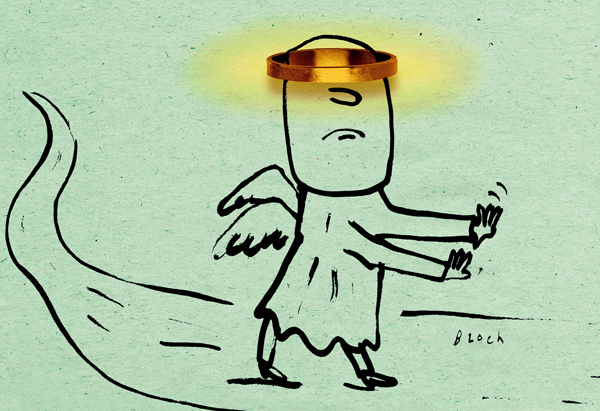Blinded by the Light?
How do you know you’re on the right spiritual path and not wandering in the desert? Martha Beck has a way to sort out the good kind of faith from the misguided.

Illustration by Serge Bloch
My religion is called Do-Be-Do-Be Do, pronounced "doo-bee-doo-bee doh." The final "doh" (Japanese for "the Way") is more properly written like this: Do-Be-Do-Be means "the Way of Do-Be-Do-Be." According to the religion's only member—me—it aims to balance the active "doing" of Western religions with the serene "being" of Eastern religions.
This name is meant to sound silly, because along with Reinhold Niebuhr, I believe that "laughter is the beginning of prayer." But when it comes to religion, I can be as serious as typhoid. Born into an intensely religious tradition I would later leave, I've studied and pondered the subject intensely. I've come to believe Marx's dictum, "Religion...is the opium of the people." Or, at least, part of it. Marx wasn't wrong—but he didn't know that opiates aren't purely negative. They can drug us or poison us or sustain us. In fact, we naturally produce the "endogenous opioids" necessary for happiness. So a quest for truth isn't about being a glazed-over religion addict or cold-turkey atheist. It's about learning which opiates are healthy and testing each new idea before we take it into our systems.
Flying High on Faith
My friend Drew never thought much about spirituality until a college friend took him to hear a charismatic preacher. Drew was immediately hooked. Listening to Preacher X, he remembers feeling "high as a kite. I would have walked on fire, juggled rattlesnakes, done anything the guy said." Drew embarked on a religious journey that now makes him blush. "I'd always questioned authority, but when I met Preacher X, that way of thinking sort of zoned out. I was like an addict—I felt stoned on being part of the group and on thinking we had the Truth. You know, no questions or uncertainty."
Drew dropped out of college and moved into a commune with other followers of Preacher X. "I was euphoric for more than a year," he says. "Then problems started coming up, some from inside my mind, some from outside." Drew found himself questioning Preacher X's insistence that he alone knew the mind of God. Soon after, a 17-year-old friend told Drew she and Preacher X were sleeping together. This major buzz kill finally jolted Drew out of his religious "high."
Drew regrets this whole uncharacteristic episode, but he was following deep-rooted patterns of human behavior. The great sociologist Max Weber hypothesized that every cultural movement began when a charismatic leader gathered a group of followers. The word charismatic is important: Though we use it to describe charming or impressive people, charisma also means the ability to connect with the divine. People follow charismatics because they purport to speak for God, providing compelling truth claims that help people feel guided, protected, and united.
This psychological pattern is the reason people attach passionately to value-based groups, from teenage gangs to political parties. It's why reasonable people may become irrationally loyal to such groups. We're wired to experience euphoria when we belong to a band of people championing common values. It literally intoxicates us.
This name is meant to sound silly, because along with Reinhold Niebuhr, I believe that "laughter is the beginning of prayer." But when it comes to religion, I can be as serious as typhoid. Born into an intensely religious tradition I would later leave, I've studied and pondered the subject intensely. I've come to believe Marx's dictum, "Religion...is the opium of the people." Or, at least, part of it. Marx wasn't wrong—but he didn't know that opiates aren't purely negative. They can drug us or poison us or sustain us. In fact, we naturally produce the "endogenous opioids" necessary for happiness. So a quest for truth isn't about being a glazed-over religion addict or cold-turkey atheist. It's about learning which opiates are healthy and testing each new idea before we take it into our systems.
Flying High on Faith
My friend Drew never thought much about spirituality until a college friend took him to hear a charismatic preacher. Drew was immediately hooked. Listening to Preacher X, he remembers feeling "high as a kite. I would have walked on fire, juggled rattlesnakes, done anything the guy said." Drew embarked on a religious journey that now makes him blush. "I'd always questioned authority, but when I met Preacher X, that way of thinking sort of zoned out. I was like an addict—I felt stoned on being part of the group and on thinking we had the Truth. You know, no questions or uncertainty."
Drew dropped out of college and moved into a commune with other followers of Preacher X. "I was euphoric for more than a year," he says. "Then problems started coming up, some from inside my mind, some from outside." Drew found himself questioning Preacher X's insistence that he alone knew the mind of God. Soon after, a 17-year-old friend told Drew she and Preacher X were sleeping together. This major buzz kill finally jolted Drew out of his religious "high."
Drew regrets this whole uncharacteristic episode, but he was following deep-rooted patterns of human behavior. The great sociologist Max Weber hypothesized that every cultural movement began when a charismatic leader gathered a group of followers. The word charismatic is important: Though we use it to describe charming or impressive people, charisma also means the ability to connect with the divine. People follow charismatics because they purport to speak for God, providing compelling truth claims that help people feel guided, protected, and united.
This psychological pattern is the reason people attach passionately to value-based groups, from teenage gangs to political parties. It's why reasonable people may become irrationally loyal to such groups. We're wired to experience euphoria when we belong to a band of people championing common values. It literally intoxicates us.



